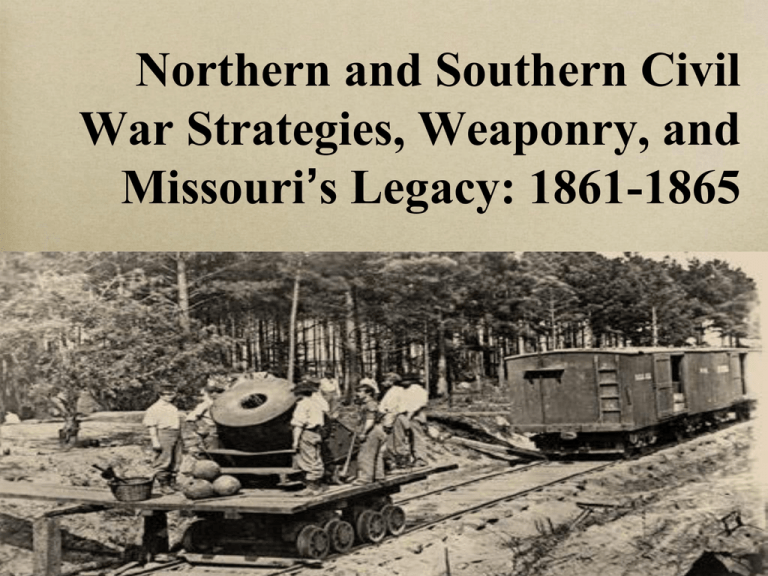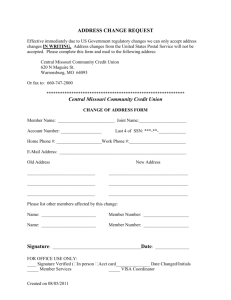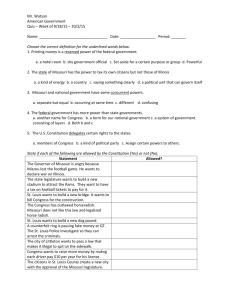Civil War Strategy & Weaponry
advertisement

Northern and Southern Civil War Strategies, Weaponry, and Missouri’s Legacy: 1861-1865 Overview Overview of the North & South Northern Strategy Southern Strategy The Changing Nature of Warfare Missouri in the Civil War U.S. War Deaths in Thousands 620 496 372 248 124 0 Rev 1812 Mex Civil WW I WW II Korean Vietnam Iraq Northern Strategy Squeeze the South “Anaconda” plan Blockade Southern ports Gain control of Mississippi Cairo, IL to New Orleans Northern Strategy Isolate and disorganize Confederacy Southern Union sympathizers get South to surrender Designed by Gen. Scott Keep border states in Union GOAL: No secession & compliance with constitution Southern Strategy Defensive war of attrition (strategy of winning by not losing) Wear out opponent G. Washington’s strategy in Revolutionary War Get European support Jackson, Beauregard, Lee Southern Strategy South - twice the size of 13 original colonies GOAL: Secession and independence Jefferson Davis - President Civil War Armaments & Technology “Why did they fight in lines?” “Were they Stupid?” NO!!!! • • • Psychology – closeness in numbers. Battles were terrifying 1-150 bullets actually hit somebody Could see flags above firing smoke fog for formation Wagon Trains • • Women – had to feed and take care of the men Confederate Sterling Price’s Wagon Train through Missouri stretched (reportedly) 15 miles Howitzers Threw 12-pound shell up to 1000 yards (1/2 mile) Could be easily disassembled & carried by mule Smoothbore Howitzer Gatling Gun Limited use in the Civil War - 1864 600 rounds (bullets) in one minute Ironclad ships Iron covered vessels Revolving turret (cannon) Brings an end to tall-masted wooden military ships Springfield Rifle Union Army’s standard weapon Rifled bore - greater accuracy 150 - 200 yards (compared to 80 yards for smooth bore weapons) Gives rise to trench warfare Single Shot? Why not multiple shot? Telegraph Long distance communication Organized troop movement Train Allowed for quick movement of troops & supplies All major Civil War battles took place 100 or miles less from RR tracks Disease Disease was the chief killer in the war claiming two soldiers for every one killed in battle. Hospitals were so unsanitary that one Union soldier lamented: "If a fellow has [to go to the] Hospital, you might as well say goodbye.” -Ken Burns - Civil War The Civil War Begins April 12 & 13 Confederate forces bombarded Fort Sumter Fort Surrenders - no one killed Lincoln calls for 75,000 volunteers to end insurrection Virginia, N. Carolina, Arkansas and Tennessee join the Confederacy http://gurleyalabama.contactez.net/WalkerCivilWar.html Where does Missouri Fit in? Missouri ranks 3rd only to Virginia and Tennessee in battles and skirmishes fought among states. Western Missouri was destroyed under General Order No. 11 by Union General Thomas Ewing. Homes gone, people killed, confederate sympathy - this area becomes known as the “Burnt District” Battle of Little Blue Ridge and Battle of Westport near Independence, MO, ranks in the top 1% of significant battles during the Civil War according to Civil War historians The Battle of Wilson’s Creek, The Battle of Lexington, and several battles in Independence were decisive in the overall theatre of the war What if: St. Louis falls? The Confederates begin a legitimate government? General Order No. 11 By: George Caleb Bingham Confederate Sterling Price’s Raids Across Missouri Gen. Price's raid on Missouri in fall of 1864 caused considerable panic to the Federals within the State. Over 6,000 troops had to be recalled from the looting/burning of Georgia to pursue Gen. Price's 12,000 man cavalry force threatening St. Louis. After leaving Doniphan Missouri on Sept. 20, 1864, Price moved against the Federals in Ft. Davidson at Pilot Knob in hope of capturing vitally needed guns and ammunition for his men. Due to the deep trench before the fortification at Ft. Davidson, Price lost from 800 to 1,000 men in his attempts to rush the fort. In preparation of attacking St. Louis, Price sent a squad of Shelby's cavalry to secure the Cheltenham Post/Telegraph office, which was then only four miles outside of the city. Due to a change of plans after entering Franklin County, Price ordered the attack on St. Louis aborted, and proceeded west to Jefferson City. http://www.pricecamp.org/lastraid.htm







